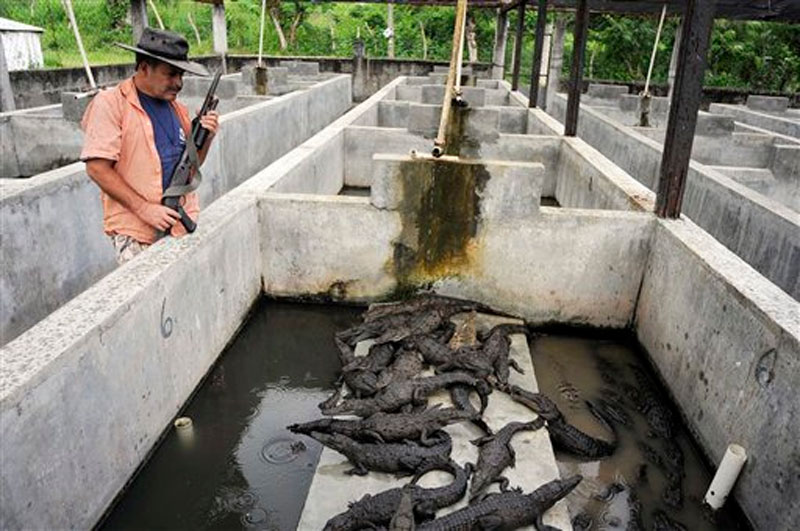Thousands of crocodiles go hungry at Honduras farm
SAN MANUEL CORTES: A US investigation into alleged money laundering for drug traffickers by one of Honduras' most powerful families has resulted in some unusual victims: thousands of hungry crocodiles.
At least 7,500 crocodiles on a private farm in northern Honduras have been poorly fed in recent weeks because of a lack of resources, authorities and employees at the property said. The bank accounts of the farm's owner, the Rosenthal family, were seized during a probe into accusations they were operating a money laundering network linked to drug trafficking.
Farm employees told The Associated Press on Wednesday that the animals went without food for more than a month, but were finally fed over the weekend thanks to donations.
Worker Antonio Mejia said at least 200 small crocodiles had died, but Pablo Dubon, northern regional director of Honduras' Forest Conservation Institute, said he doubted that claim.
Mejia said the crocodiles were supposedly raised for their skins.
The workers said there were about 9,000 crocodiles at the farm, but authorities said the number probably was closer to 7,500.
"There have been difficulties in feeding (the crocodiles)," Dubon told the AP by telephone.
He said he asked private companies to donate money to buy food for the crocodiles and on Sunday officials obtained about 23,000 pounds of food, most of it chicken.
Also going hungry at the farm were 12 mammals, including lions and monkeys.
Calls seeking comment from the company that manages the farm rang unanswered.
The crocodiles normally chow down on almost any kind of meat — they usually get chicken guts, heads, feet and spoiled chicken — and Mejia said they need a total of 9,000 to 12,000 pounds of food a day.
Farm worker Marco Lazo said sometimes a horse is chopped up and thrown into the mix. "They have gone hungry for about 45 days," before the donated food arrived Saturday, he said.
The US Justice Department announced October 7 that it had indicted former Honduran Vice President Jaime Roland Rosenthal, his son Yani Benjamin Rosenthal and nephew Yankel Rosenthal under the Kingpin act. Yankel Rosenthal was arrested in the United States.
The Justice Department said the Rosenthals "provide money laundering and other services that support the international narcotics trafficking activities of multiple Central American drug traffickers and their criminal organizations."
The Rosenthals have denied the accusations.
The Honduran government responded by seizing the property of the companies held by Grupo Continental, owned by the Rosenthal family.
The Forest Conservation Institute says that although the farm where the crocodiles live was not seized, it was affected because the Rosenthal family's bank accounts were frozen.
Drug kingpins have a long history of operating money-losing businesses in Latin America, because it allows them to launder drug money as legitimate, through fictitious costs or income from the firms.
Even the employees at the crocodile farm acknowledged it was a strange business operation.
Although the farm includes an area where crocs are slaughtered and skinned supposedly for commercial sale, Mejia said that since it opened in 1989, only two shipments of crocodile skin or meat have been exported. One shipment of 500 skins went to Japan in 2003 and another of 50 was sent in 2014, he said.
Those are the total sales for a farm that Mejia said he has been told costs about $1 million a year to run.
"You can imagine it's not profitable," he said.
"Imagine that, in 25 years, a farm that has exported two times?" he added. "How can that be?"






